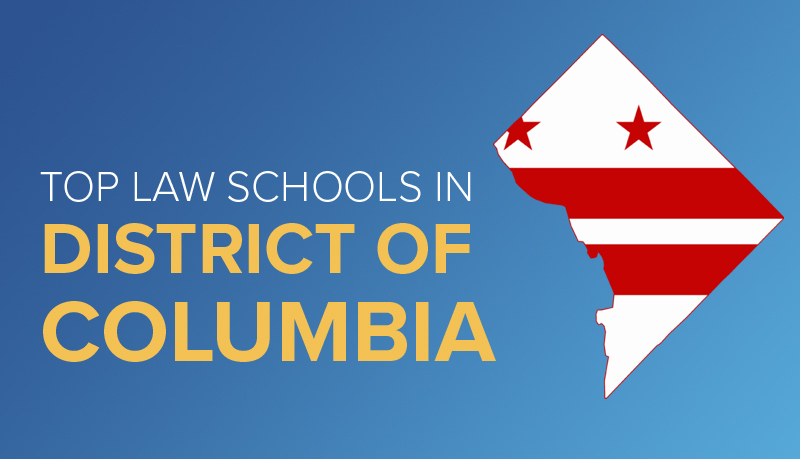History, politics, law and the Lincoln Memorial—overlooking the city and serving as a grandiose physical reminder of justice—you will find it here in the District of Columbia, otherwise known as D.C.
D.C. is a district as opposed to a state and it is the playing field of the country’s leading politicians and lawmakers. The U.S. capital is located in Washington, D.C., on the Potomac River. This is where politics and law intersect—the home of the federal government and its three branches: legislative, executive, and judicial, located at the Capitol, White House and Supreme Court.
Welcome to Capitol Hill! If attending law school in the midst of the country’s policy changers and lawmakers is important to you, keep reading to learn about the top law schools in the District of Columbia and the average LSAT scores required to be a competitive candidate.
Top Law Schools in the District of Columbia
- 1. Georgetown University Law Center
- 2. George Washington University Law School
- 3. American University Washington College of Law
- 4. Howard University School of Law
- 5. The Catholic University of America Columbus School of Law
- 6. University of District of Columbia David A. Clarke School of Law
These D.C. Law Schools are considered some of the top law schools in the U.S. with top-ranked law programs and high Bar passage rates. See what makes each school stand out in this highly Presidential and political district.
-
1. Georgetown University Law Center
U.S. News Top Law School Ranking: #15
Tuition: $63,528 (full-time)
Average GPA: 3.6
Average LSAT Score: 168
Acceptance Rate: 20.1%
Bar Passage Rate: 90.8%
The Law Center at Georgetown University is located in Washington, D.C., near the country’s capital and ranks 15 as a Top Law School by U.S. News and World Report. Given the political surroundings, it’s rather fitting that the Law Center is well known for its joint degree programs in government, including the JD/PhD with a focus on law and political processes. Georgetown has a well received reputation and has produced some notable attorneys, including Donald Burris who partnered with attorney E. Randol Schoenberg on the landmark case Altmann v. Republic of Austria, which resulted in the return of Nazi-looted art, specifically five Gustav Klimt paintings, to the rightful heir, Maria Altmann, in 2004.
The school publishes more than a dozen legal journals, including the Georgetown Journal on Poverty Law and Policy, the Georgetown Law Technology Review and the Georgetown Journal of Law and Modern Critical Race Perspectives. There are 18 clinics offered including the D.C. Street Law Program in addition to 20 research centers, institutes and initiatives, including the Center on National Security and the Law, the Institute for Constitutional Advocacy and Protection and the Georgetown Climate Center.
The application deadline falls on March 1, so be sure to get your package together earlier rather than later. Tuition is on the higher end at $63,528, but considering this is Georgetown, the name drop alone might be worth the fee and, with a student-faculty ratio at 4.8:1, you are assured personalized attention.
-
2. George Washington University Law School
U.S. News Top Law School Ranking: #27
Tuition: $63,205 (full-time)
Average GPA: 3.4
Average LSAT Score: 166
Acceptance Rate: 34.2%
Bar Passage Rate: 96.4%
The Law School at George Washington University is the oldest law school in the nation’s capital. Notable alumni include J. William Fulbright, a former senator and creator of the Fulbright Scholar Program. This Law School is ranked 27 by U.S. News and World Report and has a comparable tuition fee to Georgetown at $63,205 for full-time attendance, which ranks significantly higher at number 15. This school, however, outshines in terms of Bar passage rate at an impressive 96.4%. George Washington University also has a higher acceptance rate at 34.2%.
George Washington Law School is a participating school in the Technology-Academics-Policy forum, sponsored by Microsoft and active in legal issues including cloud computing and intellectual property. The school runs more than five legal research centers including the James F. Humphreys Complex Litigation Center and the Center for Law, Economics & Finance.
The application deadline falls on March 1, so be sure to get your application in on time. There is no fee to submit. The student-faculty ratio is slightly higher than Georgetown, but still impressive at 7:1.
-
3. American University Washington College of Law
U.S. News Top Law School Ranking: #81
Tuition: $54,130 (full-time)
Average GPA: 3.3
Average LSAT Score: 160
Acceptance Rate: 36.3%
Bar Passage Rate: 78.2%
The American University in Washington is a private research university, which was federally chartered and established by an Act of Congress on December 5, 1892. The School of Law was established in 1896 and was the first law school founded by women, the first with a female dean and the first to graduate an all-female class.
The school is currently known for its highly ranked specialty program in clinical training, part-time law, international law, intellectual property, health care and trial advocacy. The application deadline falls on March 1 and the tuition is lower compared to Georgeotown and George Washington University at $54,130 for full-time.
-
4. Howard University School of Law
U.S. News Top Law School Ranking: #91
Tuition: $33,996 (full-time)
Average GPA: 3.2
Average LSAT Score: 153
Acceptance Rate: 34.2%
Bar Passage Rate: 75.5%
Howard University School of Law was founded in 1867 and is located in the nation’s capital, Washington, D.C. It is one of the oldest law schools in the country and the oldest historically black college. Howard prides itself on diversity and inclusivity and has produced more on-campus Black American PhD recipients than any other university in the United States.
The school has a strong philosophy toward Excellence in Truth and Service and seems to bring out the best in its students. To date, Howard has produced four Rhodes Scholars, nine Truman Scholars, two Marshall Scholars, one Schwarzman Scholar, over 60 Fulbright Scholars and 22 Pickering Fellows.
Ranked 91 by the US News and World Report, Howard has a similar acceptance rate to the American University at 34.2% but a lower tuition at $33,996 for full-time students. The application deadline falls on March 15, so be sure to get your application in on time.
-
5. The Catholic University of America Columbus School of Law
U.S. News Top Law School Ranking: #102
Tuition: $54,230 (full-time)
Average GPA: 3.3
Average LSAT Score: 156
Acceptance Rate: 41.8%
Bar Passage Rate: 85%
The Catholic University of America Columbus School of Law, known for specializing in intellectual property law and securities law, is a school with a religious affiliation. Students have an opportunity to complete a joint degree through another department at Catholic University, such as the National Catholic School of Social Service or the Catholic University School of Library and Information Science. Located in the capital, students also gain access to work experience opportunities at nearby federal agencies, corporations and law firms.
The Columbus School of Law has a later application deadline of June 30. There is no fee to submit. This law school has a greater acceptance rate of 41.8% compared to the other top ranking law schools in the District of Columbia. Full-time tuition is slightly lower compared with the other Washington-based law schools, but still competitive at $54,230 for full-time and $38,020 for part-time students. The student-faculty ratio sits at 6.7:1 so you can feel confident about personalized attention.
-
6. University of District of Columbia David A. Clarke School of Law
U.S. News Top Law School Ranking: #146-193
Tuition: $13,438 (full-time)
Average GPA: 3.0
Average LSAT Score: 149
Acceptance Rate: 32.6%
Bar Passage Rate: 52%
The David A. Clarke School of Law at University of the District of Columbia is a public law school in Washington, D.C. The tuition for full-time students is significantly lower at $13,438 for full-time students in-state and $17,860 for out-of-state, but the Bar passage rate is a bit like a game of black jack—50% chance of passing. The average LSAT score accepted is slightly lower at 149.
The application deadline falls on May 1, giving you a bit of leeway on getting your application in on time. There is no fee to submit. The student-faculty ratio assures personalized attention at 4:1.
Which Law School in the District of Columbia Is Right for Me?
We know choosing a law school is extremely difficult, especially when law schools in the District of Columbia have impressive stats and so many appealing features. If you have the drive, you’ll become a great lawyer no matter where you go to law school, but these are some of our top District of Columbia law school picks, based on best offerings:
- District of Columbia Law School with the Highest Bar Passage Rate: George Washington University Law School
- District of Columbia Law School with the Highest Acceptance Rate: The Catholic University of America Columbus School of Law
- Most Affordable District of Columbia Law School: University of District of Columbia David A. Clarke School of Law
Ultimately, you need to decide what you’re looking for in a law school and what factors matter to you most. Does tuition rank the highest, the curriculum…or the proximity to Capitol Hill.
How Do I Get Accepted to a District of Columbia Law School?
Whether you’re applying to the best law school in the District of Columbia or another part of the country, the process is the same. The first step in the law school admissions timeline is to take the LSAT. Although there are no required LSAT scores for law school, all of these law schools in the District of Columbia have median LSAT scores that give you a pretty good indication of how you compare to their previous incoming class. Remember, law schools want to attract the best of the best, so make sure you give yourself the ultimate shot by getting a high LSAT score.
Ace the LSAT and Prepare for a Washington, D.C. Law School
Blueprint LSAT Prep has the best LSAT prep courses tailored to your individual learning style. From a DIY Self-Paced Online LSAT Course to a Live LSAT Class and even private LSAT tutoring, we have the LSAT course designed to increase your LSAT score by 15 points, on average!
Don’t want to commit to a prep course right now? Get access to a bunch of free LSAT resources when you create a Blueprint LSAT account. And when you’re finally ready to make the final jump into LSAT prep, we’ll be here to help!




